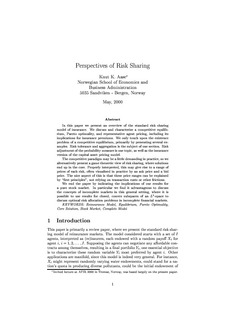Perspectives of risk sharing
Working paper
Permanent lenke
http://hdl.handle.net/11250/163783Utgivelsesdato
2000-05Metadata
Vis full innførselSamlinger
- Discussion papers (FOR) [566]
Sammendrag
In this paper we present an overview of the standard risk sharing model of insurance. We discuss and characterize a competitive equilibrium, Pareto optimality, and representative agent pricing, including its implications for insurance premiums. We only touch upon the existence problem of a competitive equilibrium, primarily by presenting several examples. Risk tolerance and aggregation is the subject of one section. Risk adjustment of the probability measure is one topic, as well as the insurance version of the capital asset pricing model.
The competitive paradigm may be a little demanding in practice, so we alternatively present a game theoretic view of risk sharing, where solutions end up in the core. Properly interpreted, this may give rise to a range of prices of each risk, often visualized in practice by an ask price and a bid price. The nice aspect of this is that these price ranges can be explained by "first principles", not relying on transaction costs or other frictions.
We end the paper by indicating the implications of our results for a pure stock market. In particular we find it advantageous to discuss the concepts of incomplete markets in this general setting, where it is possible to use results for closed, convex subspaces of an L2-space to discuss optimal risk allocation problems in incomplete financial markets.
Utgiver
Norwegian School of Economics and Business Administration. Department of Finance and Management ScienceSerie
Discussion paper2000:12
